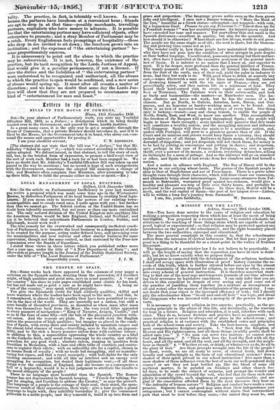Irtitr5 til tti Eititnr.
BILLS IN THE 110IISE OF COMMQRS.
Rams, 13th November 18.56. Sua—In your abstract of Parliamentary work; you state my Youthful Offenders Bill, 1853, as it failure ;- a deeciiptien which its being finally handed over to the Government, and passed by them, hardly justifies. In a great many cases, it is the only way to get a measure through the Rouse of Commons, that a private Member should introduce it, and if it is liked by the Rouse, let the Government take it in hand, who alone can com- mand the means and o.pportunities for passing it.
The abstract did not state that the bill was ""a failure," but that Mr. Adderley "failed to eirry " it ;—which was correct according to the classifi- cation adopted. We did not intend, in that abstract, to tell the story of each bill, but, in the briefest -form of expression, to present a bird's-eye view of the sort of work each Member had a turn for or had been engaged in. We have no doubt that Mr. Adderley's Youthful Offenders Bill was taken up and passed in the way he mentions - but no record is kept of such areangementa with the Government, sometimes the adopted • bill undergoes a change of title, and Menthers often complain that Ministers, after promising to take up_their bills, fail to fulfil the promise either in letter or epirit.--En.)


























 Previous page
Previous page